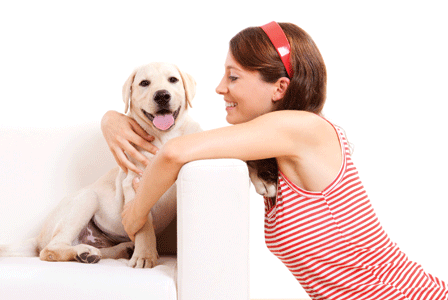
Pets, like humans, can be treated with natural remedies. We offer some tips for natural pet health.
It was the eyes that got to you. From the moment you looked into those deep brown puppy pools of love, you were hooked. Your house has been animal-proofed in preparation for the homecoming and your wallet is lighter—but you don’t mind.
Animals come with no strings attached; they love unconditionally; and they don’t talk back. What’s not to love? Here’s why pets are so important, and how to keep them healthy—naturally.
Puppy—or guppy—love
The Purdue University School of Veterinary Medicine’s Center for the Human-Animal Bond has found the relationships people share with their pets are mutually beneficial, both psychologically and physiologically.
Pet owners tend to have lower blood pressure and less anxiety, and experience overall feelings of happiness. Having a trusted companion around can also help ease the stress of divorce, widowhood, or relocation.
Dogs and cats aren’t the only animals that enhance our well-being. Simply watching fish weave through a tank or listening to birds sing can elicit the same stress-lowering responses.
Treat your pet naturally
You use natural remedies for whatever ails you, and the same should go for your pet. Consider the following treatments.
Natural ear mite relief
Mites are common in cats and, to a lesser extent, dogs. To treat them, mix 1/2 oz (1 Tbsp/15 mL) olive oil and 400 IU of vitamin E in a small bowl and warm to body temperature. Apply half a dropper-full into your pet’s ear and massage the ear canal for about a minute. Gently wipe the area to remove any extra oil. Repeat treatment once every other day for six days.
Apple cider vinegar
This is handy to treat everything from paw licking to easing constipation, gas, and urinary tract infections. It is also effective for relieving itchy skin and removing skunk odour.
- Add 1 tsp (5 mL) to your cat’s or small dog’s water daily to maintain general good health.
- Measure 2 tsp (10 mL) into your medium-sized dog’s water.
- Use 1 Tbsp (15 mL) for large dogs.
A word of caution: if your pet is allergic to yeast, has a chronic yeast infection, or suffers from irritated intestines, refrain from apple cider vinegar treatment.
Neem oil
Neem is an effective healing agent for small cuts and abrasions and also acts as a deterrent to fleas, ticks, and scabies. There are good neem oil sprays for pets on the market; simply spritz your pet with some every week or so during flea season.
Busting bad habits
No matter how much you love your pet, it can be frustrating watching your carpets or furniture being systematically destroyed.
Urinating outside the box
If you have a cat that likes to urinate in places other than his litter box, place aluminum foil over the cleaned area to deter your cat from returning.
Clawing or chewing
Apply bitter apple or lime spray to carpeting, sofa arms, or table legs to deter these behaviours.
Eating poop
It’s a disgusting habit, but some dogs are prone to eating their own feces or going into the cat’s litter box to snack on a “delicacy.” Vigilance is necessary to deter your dog from this behaviour, but there are other simple ways to yield positive results.
- Natural supplements made from fermented vegetables and added to your dog’s food can make fecal matter less appetizing.
- You can also try adding a small amount of pineapple, spinach, or pumpkin to your dog’s regular meals, which can bring similar results.
Pet 911
These guidelines can help you determine what warrants a trip to the vet.
Worms
If not treated quickly, worms can spread to other pets and even family members. Small white moving worms usually mean pinworms, while long white strands are typical of tapeworms. Worms can show up in either vomit or stools and are easily treated with medication.
Lumps
Take your pet to the vet as soon as you notice a lump of any kind. Lumps are harmless in most cases, but an early diagnosis can make the difference between life and death.
Vomiting
All pets vomit from time to time, but repeated vomiting of bright yellow bile signals a visit to the vet. If your pet has a dry nose and her body feels hot, she may also have a fever.
Diarrhea
Loose, watery stools can simply be the result of something your pet ate that doesn’t agree with him, but if it’s persistent or contains blood, a visit to the vet is necessary.



